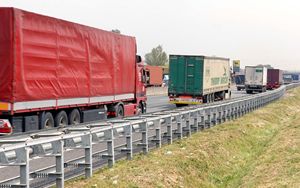(Finance) – Il CoreperCommittee of Permanent Representatives of the Member States to the EU, confirmed this afternoon in Brussels theinformal provisional agreement which was reached in January with the European Parliament and the Commission on the regulation for the reduction of emissions of the vehicles heavy. The current Belgian presidency of the EU Council reported this on its X account, recalling that the objective of the regulation is to “further reduce CO2 emissions in the road transport sector and introduce new objectives for 2030, 2035 and 2040” .
There reduction of emissions will have to reach 45% by 2030, 60% by 2035 and 90% by 2040, for all new heavy vehicles placed on the EU market. According to what we learn in Brussels, the provisional agreement of the “trilogue” was approved at majority qualifiedwith the abstention of Italy, Poland, the Czech Republic and Slovakia, while the Germany voted in favor. A first attempt to approve the agreement in Coreper, on 7 February, was postponed until today by the Belgian presidency.
In fact, there was a risk that he would also abstain Germany, due to the difference in positions between the Liberals, on the one hand, and the Greens on the other, within the governing coalition in Berlin. In this case the agreement would have been rejected (abstentions count as a negative vote when they do not allow achieving a qualified majority in favor, i.e. 55% of countries representing at least 65% of the Union’s population). The risk of German abstention was averted today with the inclusion of a clausea “recital” of the regulation without binding legal value, which opens up the possibility of continuing to market vehicles powered by e-fuels if they are proven to be “neutral” in terms of CO2 emissions.
A situation substantially identical to that which occurred a year ago regarding the new rules on CO2 emissions from cars, which will have to be eliminated by 2035, when it will be prohibited to sell new cars with internal combustion engines, a gas And diesel. Even then, Germany obtained a “consideration” to allow the use of synthetic fuels, if they were “neutral” in terms of emissions. Italy, however, which had supported Germany’s request by initially lacking a qualified majority in the final vote, did not obtain a similar opening that it had requested for the biofuelsand found herself isolated.
